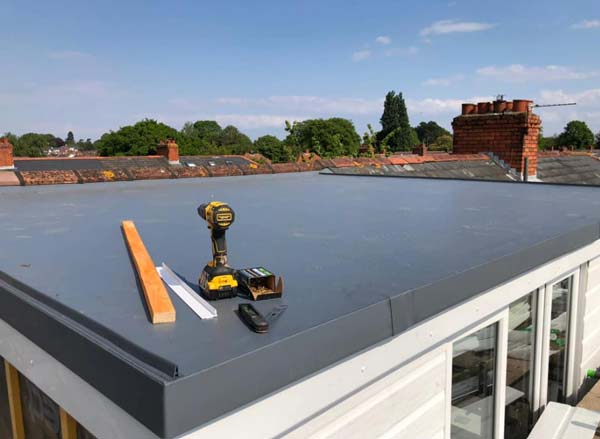Flat roofs are a cost-effective roofing system for residential homes and commercial centers and offer room to install solar panels, gardens, and air conditioning units. However, the roofing market has different kinds of flat roofs, depending on your budget, needs, and aesthetics. Explore the most common types of flat roofing systems below.

1. Built-Up Roofing
Roofers have used built-up systems on flat and low-pitched roofs for over 100 years, although with different materials today than what they used decades ago. Roofing professionals construct these roofs in various ways, although a typical built-up roof has at least three materials.
The built-up system often starts with a base of thick insulation and a cover board. Then, roofers install alternating layers of bitumen or asphalt and ply sheets. The contractors can apply bitumen with cold-applied adhesive solutions or hot torches. A finely crushed stone or gravel layer tops the roofing system, and an extra UV layer may be installed to maximize heat resistance.
The alternating layers in a built-up roofing system prevent water intrusion while the insulation sheets enhance energy efficiency. The roof is fire-resistant, which is especially important in commercial centers.
Built-up roofs also suit residential houses with flat roofs since asphalt shingles cannot shed water. Built-up systems last 15 to 30 years but can reach 40 years with proper maintenance in mild weather.
2. Modified Bitumen Roofing
Modified bitumen roofs are closely related to built-up systems and first appeared in the mid-1960s in Europe. Manufacturers make modified bitumen roofs from asphalt combined with polymers and reinforced with fiberglass. The result is a durable yet flexible waterproof roofing system that suits commercial environments.
Early developers of modified bitumen roofs wanted to improve the weakness of built-up roofing. While the latter was reliable, it was heavy, challenging to repair, and prone to damage from extreme weather conditions. By combining bitumen with fiberglass and polymers into a simple membrane, modified bitumen is easy to install and holds up well in severe weather.
Modified bitumen roofing is available in rolls that roofers place on the substrate via an adhesive. Like built-up roofing, modified bitumen rolls can either be cold-adhered or heat welded.
This roof lasts for 20 years when properly installed and resists damage from foot traffic and weather. Additionally, the system expands and contracts with temperature changes without a reduction in performance.
3. EPDM
Ethylene Propylene Diene Monomer (EPDM) is a single-ply membrane roofing system for residential and commercial flat roofs. The material’s primary ingredients are ethylene and propylene, obtained from oil and natural gas.
EPDM is available as thin sheets 0.030 to 0.60 inches thick, which a roofer installs on the roof in a single layer. EPDM sheets are easy to install, as roofers adhere them to the roof deck via adhesives. Professional installation is vital with EPDM roofing because it has numerous seams that can lead to leaking.
EPDM has a long-life expectancy and stands up well to extreme weather. The system also features recycled materials like rubber tires if you want an eco-friendlier roofing solution.
4. PVC Roofing
When many people think of PVC, they imagine the pipes in their plumbing system. PVC (polyvinyl chloride) is a high-strength thermoplastic used in construction. Manufacturers add chemicals to the thermoplastic to harden it for plumbing and softening materials to make it flexible for roofing.
Roofers weld the roof’s seams with hot air guns to form waterproof barriers that resist water damage. When correctly installed and maintained, PVC roofs can last as long as 30 years. PVC roofs are also light-colored, reflecting the sun’s rays and keeping your home or commercial building cool in summer.
Flat roofs have come a long way, and modern buyers can enjoy advanced products that perform exceptionally in harsh weather. Our roofers at Schultz Roofing & Repairs, LLC, specialize in flat roofs and will help you pick the right material for your budget and roofing needs. Contact us today to learn more.
